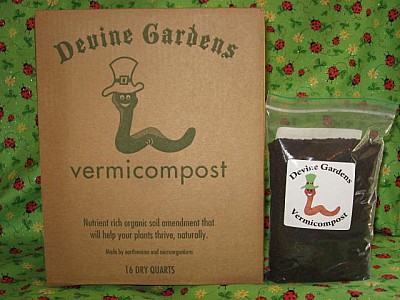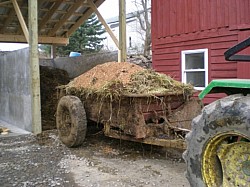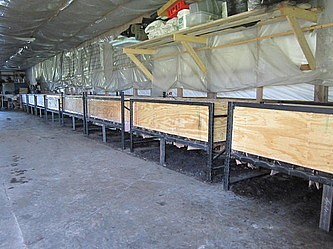October 15, 2013
To expand and support farm-based compost markets in the Northeast, NERC was awarded a grant from the Northeast Sustainable Agriculture Research and Education (SARE) program. Resources developed by NERC for the project, as well as presentations from seven compost marketing workshops, are posted on NERC’s website. NERC provided technical assistance to farm compost operations, including development of operation-specific marketing plans.
Today’s blog features a case study on Devine Gardens, a farm compost operation which participated in NERC’s project.
Overview
 Devine Gardens, a 70-acre farm, was purchased in November 2009, by Tina and Mike Jacobs. A livestock barn and some pasture land on the farm are leased by a farmer for raising 30 head of cattle, as well as pigs. The farm includes around 15 acres of hay fields, about 20 acres of woods, and additional pasture. Tina and Mike’s hope is to slowly bring the livestock barn and the land back into productive agriculture. In 2013, the fields were plowed and reseeded with hay. Rotting fence posts and old barbed wire removed, and a high tensile fence installed near the livestock barn to allow the cows to pasture. The farmer who raises the cattle has also planted corn for feed. Devine Gardens has a license from the New York Department of Agriculture and Markets to sell live plants.
Devine Gardens, a 70-acre farm, was purchased in November 2009, by Tina and Mike Jacobs. A livestock barn and some pasture land on the farm are leased by a farmer for raising 30 head of cattle, as well as pigs. The farm includes around 15 acres of hay fields, about 20 acres of woods, and additional pasture. Tina and Mike’s hope is to slowly bring the livestock barn and the land back into productive agriculture. In 2013, the fields were plowed and reseeded with hay. Rotting fence posts and old barbed wire removed, and a high tensile fence installed near the livestock barn to allow the cows to pasture. The farmer who raises the cattle has also planted corn for feed. Devine Gardens has a license from the New York Department of Agriculture and Markets to sell live plants.
Tina Jacobs, proprietor of Devine Gardens, runs a vermicompost (worm composting) business on the farm. The previous owner of the farm had a vermicompost operation. When the operation closed, the remaining vermicast (worm castings) stock and worms were purchased by Devine Gardens. The Devine Gardens vermicompost operation continues to operate, with additional containers and equipment for the operation undertaken by Devine Gardens.
Devine Gardens presents a unique agricultural business model. The farm business uses farmland for growing hay and pasture, and leases the livestock barn to a farmer for raising cattle and pigs. The bedding and manure generated from the cattle and pigs is in turn composted to produce a variety of value-added farm products.
Manure and bedding from the livestock operation run through the lease arrangement, is used for feedstock in an aerated compost bay prior to being transferred to the operation’s worm bins. This business relationship assures an ongoing, quality feedstock. Some used horse bedding (chopped straw with some sawdust) is also collected from a nearby horse operation by Devine Gardens and first used as bedded pack for the cattle, prior to use in the compost.
Compost Method and Equipment
The collected manure and bedded pack along with additional horse bedding, as needed, is mixed to obtain a good carbon nitrogen ratio A TMR horizontal mixer is used. The material is then transferred to an aerated compost bay to be composted. The aerated bay system, constructed in 2012, is an O2Compost system consisting of four bays. PVC piping is laid into grooves in the cement flooring of the bays. The piping is connected to an electric blower system designed to effectively aerate the composting organics.
 The blower cycles on and off 24 hours a day with the objective of maintaining the materials at temperature of 131 °F, or higher, for a minimum of three days to sufficiently destroy any pathogens and weed seeds and to promote rapid decomposition. The pile temperature can be easily controlled by adjusting the airflow into the pile. The bays have concrete retainer and divider walls. A roof covers all bays to keep rain and snow off the piles and to provide shade during the summer months.
The blower cycles on and off 24 hours a day with the objective of maintaining the materials at temperature of 131 °F, or higher, for a minimum of three days to sufficiently destroy any pathogens and weed seeds and to promote rapid decomposition. The pile temperature can be easily controlled by adjusting the airflow into the pile. The bays have concrete retainer and divider walls. A roof covers all bays to keep rain and snow off the piles and to provide shade during the summer months.
The system is arranged so that one bay is filled up and actively composting for 30 days or more. Additional materials are placed in the second bay, where material is aerated and actively composts while materials are placed in the third bay, and then the fourth bay. The compost in the first bay is then removed to a separate area for curing and storage, allowing for the cycle to begin again with fresh manure and bedding.
Finished compost from the aerated bays is either cured for sale or is used as a pre-composted feedstock for the Devine Garden’s vermicomposting operation. Compost destined for direct sale is cured for at least two months in a used truck body storage container placed next to the livestock barn.
Pre-composted material used for vermicompost feedstock is fed to the worms every four days. The worms are misted with water twice a day, or as needed, depending on weather conditions. The worm bins were constructed by Devine Gardens. The bins are 8 feet long by 4 feet wide by 2 feet high. The bins were designed with a proprietary mechanism on the bottom to allow for easy removal and harvesting of worm castings. The bins are lined with electrical heat cables with temperatures maintained at about 55° F during the winter months. This allows the worms to remain active all year around.
In the summer of 2013, additional worm bins were constructed with the goal of producing four times as much vermicompost as produced the prior year.
The finished vermicompost is screened to 1/8" prior to packaging and sale.
Marketing
Studies have shown that vermicompost enhances plant growth, suppresses disease in plants, and helps to increase microbial activity in soil. Using vermicompost also improves water retention, aeration, and porosity in soils. Devine Gardens effectively promotes these and other qualities of using vermicompost through its website marketing and customer education. Its marketing not only promotes the benefits of vermicompost, but effectively focusses on Devine Gardens products and what sets Devine Gardens’ vermicompost apart from regular compost and other soil supplements.
Devine Gardens’ vermicompost is tested using a regular compost analysis to test for nutrient levels and also a food web analysis from Soil Foodweb, which shows what microorganisms are present and at what levels. These tests are posted on the website, and discussed, and promoted as demonstrating that Devine Gardens’ vermicompost product is a quality product.
Compost Utilization, Customer Base, and Sales
Land is leased to a farmer to raise cattle and pigs. This arrangement provides some revenue for the farm operation along with a guaranteed feedstock for the vermicompost operation.
Devine Gardens markets its vermicompost in “Earth-friendly” packaging. The bags and box used in the packaging are both biodegradable.
 Vermicompost packaging and pricing is as follows:
Vermicompost packaging and pricing is as follows:
- 1 quart bag sells for $3
- 16 quart box sells for $15
- Bulk sales, call for pricing
- Delivery by the yard is available, rates based on location
Devine Garden Vermicompost is sold at several retail outlets in Central New York and Devine Gardens also sells its packaged product at the Central New York Regional Farmers Market in Syracuse, the Cazenovia Farmers Market, and through e-commerce on the Devine Gardens website. In addition, the product is marketed at numerous festivals and garden shows.
Devine Gardens also sells composting worms for customers to start their own vermicompost bin. Composting worms are sold through the Devine Garden’s website:
- 1 pound of red wigglers sells for $29 + shipping
- 1/2 pound red wigglers sells for $15 + shipping
In its first three years of operation, sales increased 60%. In 2012, product sales were just under $3,200. Inventory in each of these years has sold out.
Challenges and Solutions
Challenge: Developing a business model to cost-effectively use available farm land and buildings resulting in sales of a value-added product.
Solution: Developing a sound foundation in how to run a vermicomposting business by attending conferences, conducting research, and consulting with experts, as well as compost marketing workshops and researching effective marketing techniques. This knowledge was then applied to the design and construction of worm bins, feedstock and recipe development, and product marketing.
Challenge: Determining the appropriate investment in equipment and infrastructure in order to maximize product development and sales potential in the most cost effective manner.
Solution: Sales of vermicompost stock obtained with the purchase of the farm enabled immediate product sales and the ability to “test” marketing strategies and product packaging. Developing an effective packaging and marketing strategy to lay the foundation for expanding the vermicompost business, construction of new worm bins and the aerated composting system to improve vermicompost feedstock and allow for a diversity of compost products.
Challenge: Working with the farmer leasing the barn and pasture to increase bedding used for bedded pack in order to both more humanely house the animals and to increase the proper mix of carbon materials (bedding) and manure removed from the barn for composting.
Solution: Ongoing negotiations and providing the farmer with animal bedding for use at no cost.

Future Plans
Vermicompost is increasingly used by organic growers and horticulturalists. It is also used and sold by nurseries as a soil amendment or planting medium for ornamental plants. Research demonstrating the beneficial uses of vermicompost on plants and soil is helping to increase market outlets. Blending vermicompost with compost can give the product a competitive edge.
Devine Gardens is manufacturing compost and vermicompost with the intention of offering a diversity of products for sale.
Future plans include:
- Sales of compost beginning in the spring of 2014.
- Ongoing and expanded sales of vermicompost and increasing customer base.
- Expansion of product line to include a mixed compost and vermicompost product.
- Quadrupling of production capabilities in 2013 will contribute to corresponding increases in vermicompost inventory in the next few years.
- Expand fall sales, with a focus on the local farmer’s market in Hamilton and outreach to potential retail outlets in Hamilton.
For more information on Devine Gardens, see the complete case study.




Comments (1)
Jenn:
Oct 18, 2013 at 05:31 PM
I love this product. The plants became extremely healthy, green and seemed to have a better recovery when there is a setback.
Add a Comment